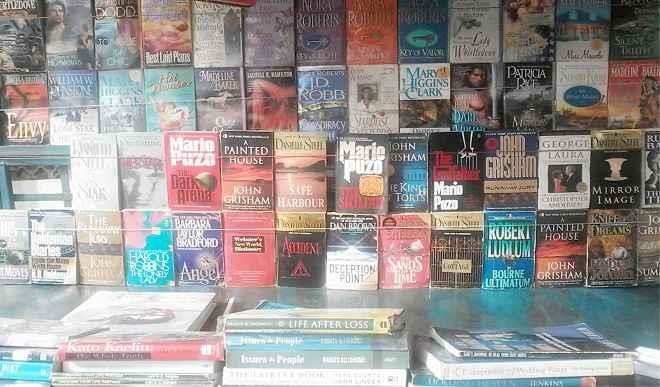Minutes at a bookstand without Nigerian books
I was in Garki, Abuja, and not rooting for a story to write when I saw this bookstand. It was a small stall with a variety of books arranged neatly on it. It reminded me of how we used to trot to a line of fancy kiosks, while in primary school, for snacks. The difference […]


I was in Garki, Abuja, and not rooting for a story to write when I saw this bookstand. It was a small stall with a variety of books arranged neatly on it. It reminded me of how we used to trot to a line of fancy kiosks, while in primary school, for snacks. The difference was, this 2017 adult treat was a colony of books.
Books have always taken me to distant planets as far back as I can remember and this one, owned by Mrs. Magdalene Daniel and her husband, was no different. I was about to hail a cab, but hey, twenty minutes with a bookstand wouldn’t hurt anyone, I decided.
Here I was, face-to-face with Mario Puzo’s ‘The Sicilian’, ‘The Godfather’ (don’t get me started on this masterpiece), and ‘The Dark Arena’. Wait, this is just the beginning. There’s Danielle Steel’s ‘Star’ and ‘Safe Harbour’. John Grisham’s ‘The Runaway Jury’, ‘A Painted House’, and ‘The King of Torts’.
Robert Ludlum is a writer I respect when it comes to crime thriller. This bookstand held his books, including those of Tom Clancy, Sidney Sheldon, Dan Brown and the list continues.
But strangely, there wasn’t a single Nigerian book. Not one.
“My customers don’t patronise them,” Mrs. Samuel said, adding that she learnt this when she actually bought them.
Has she come across the novel, ‘Season of Crimson Blossoms’, written by Abubakar Adam Ibrahim and which won the NLNG-sponsored Nigerian Prize for Literature in 2016? Her answer was negative. Has anyone asked for the book? Same negative response.
Seated next to Mrs. Samuel in the booth of the stall is her friend, Mrs. Eunice Ejila, a bookworm who has monitored the growth of the shop for about six years. When she initially came to live in Garki, she noticed the bookstand and wondered if there were people who patronised it at all. Overtime she got her answer, when she watched women park their cars and leave with up to twenty copies of novels, most times romance, which they instantly paid for.
“I was surprised about the kind of people that patronised the stand,” she pointed out. So Mrs. Ejila came face-to-face with the reality that against the notion that Nigerians don’t read, they actually do. “I knew a lady who came from out of town to pick books worth fifteen thousand naira. People are really investing in books because they see the importance. Most of them are house wives. A woman once told me she reads a book in a day and it keeps her busy,” she said.
The idea for the bookstand came when Mrs. Samuel’s husband pondered on a business to run. One thing led to another when he met a bookish friend poring over books and Mr Samuel got talking with a man in the business. In no time, with the necessary connections in place, he was on his way to and from Lagos with a load of books for sale.
But like all happy stories, this one has a twist to it. With the recession, there has been a slight drop in patronage. But Mrs. Samuel said once they bring in new stock from Lagos where imports from the United States come in, they place a call to their customers. It’s a matter of building relationships, and this they have done with their customers. “They immediately come to purchase,” she said.
Romance books appear to dominate the bookstand I noticed, Novels written by Nora Roberts, Jane Feather, Mary Higgins Clark and many more.
I had a nice time, but couldn’t help feeling dejected that there wasn’t a single Nigerian novel, short story collection, or book of poems to purchase. But the memory of Mrs. Ejila’s words made me smile: “The mentality that if you want to hide something from a black man you should put it in a book is beginning to fade away, because Nigerians read.
